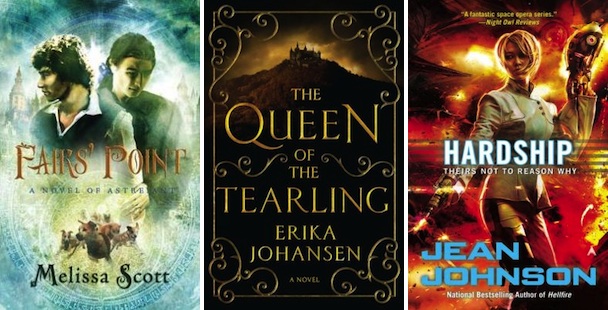Fairs’ Point by Melissa Scott (Lethe Press, 2014) is the long-awaited novel-length continuation of the novels of Astreiant. The first two Astreiant books, Point of Hopes and Point of Dreams, were co-written by Scott and her late partner, Lisa A. Barnett, over a decade ago. In 2012, Scott released a novella, Point of Knives, whose events take place between the original two novels, but this is the first true sequel.
And damn, is it an excellent book. The city of Astreiant is a vivid and compelling setting, in all its early-modern-approximate glory—it feels like a real and complex city, with a real city’s currents swirling through its streets. The magic of Astreiant’s world is the magic of Hermetic science, reliant on astrology—but astrology is a key part of everyone’s lives, and everyone consults horoscopes: I love it.
In Fairs’ Point, Rathe and Eslingen are faced with new challenges and a fresh mystery. A major bankruptcy has caused problems for the city’s economy—and seen Eslingen end up with a racing dog just in time for the big dog races in New Fair. (Racing terriers. I love this book.) Dead men and mysteriously vanishing silver combine with rivalries in district policing to create a rivetingly entertaining read.
And yes. It is possible I’m a little too fond of these books.
Erika Johansen’s The Queen of the Tearling (UK: Bantam Press, US: Harper, 2014) is that rara avis, a debut novel optioned for film before it ever hit the shelves—a film already in development—and seemingly destined for commercial success. We all know luck plays as much a part in any of these things as artistic merit, and thus I went into The Queen of the Tearling fully expecting to be seriously underwhelmed. Instead, I found a book with a strong narrative through-line, one that reminded me in equal parts of Kristin Cashore’s Graceling and Katherine Addison’s The Goblin Emperor. A fantasy novel set in a different world—but a world whose history has a direct connection to our present time. The world presents a puzzle to the reader quite aside from the perilous matters of life, death and state facing the book’s protagonist, idealistic young Queen Kelsea—a puzzle I’ll look forward to seeing solved.
Much as I enjoyed the novel, and much as I want to find out what happens next, I can’t be uncritical, however. Johansen sets her story in a colonised world, but one which the narrative holds to have been empty before the settlers came. In a fictional world where whiteness is the default—so the narrative informs us—it’s impossible not to see this worldbuilding choice as a reflection of uninterrogated imperialist assumptions about race and history. Johansen’s fantasy world is a white, straight, cisgender one, and despite the appeal of Kelsea as a character and the story’s superficial thematic resemblance to Graceling and narrative resemblance to The Goblin Emperor, The Queen of the Tearling’s conservative choices make this a weaker novel than either.
I still want to find out what happens next, though.
Jean Johnson’s Hardship is the fourth and latest instalment in her military space opera series starring a precognitive psychic. It’s a fun, fast-moving story, not too deep and not too serious, but pretty entertaining.
I had intended to talk about Elizabeth Bear’s One-Eyed Jack and Rebecca Levene’s debut novel Smiler’s Fair in this column. Unfortunately a small bit of travelling intervened, and instead of reading One-Eyed Jack and Smiler’s Fair your humble correspondent did things like arm-wrestle Geoff Ryman (it seemed like a good idea at the time!) and shake hands with Peter Davison and David Tennant, rather than finish books that one had in train.
So instead I’ll finish up by talking about LonCon3 and the Hugo Awards ceremony, instead of books. As you may or may not recall, your correspondent was a finalist in the Fan Writer category, along with Abigail Nussbaum, Foz Meadows, Mark Oshiro, and the ultimate winner, Kameron Hurley.
It was an utter thrill to watch Sofia Samatar win the John W. Campbell Award, with an excellent speech delivered on her behalf. It was just as great a thrill to see Kate Elliott accept a Hugo for Best Fan Writer on Kameron Hurley’s behalf, and one on behalf of Julie Dillon for Best Professional Artist. It was wonderful to see Tricia Sullivan accept a Hugo for Best Related Work on Kameron Hurley’s behalf too: Hurley’s speeches were things of power (and can be read here), and speak to the sea-change taking place in the culture of commentary on and around science fiction. (This might be the first year ever someone’s won two Hugos for the same body of work, but Hurley has been on fire as an essayist.) And John Chu’s speech after he won for “The Water That Falls On You From Nowhere” is quite possibly one of the most touching things I’ve ever heard.
But it was particularly marvellous to see Ann Leckie receive a Hugo for Ancillary Justice, and witness three-quarters of the auditorium stand up to applaud. Because Ancillary Justice is the space opera novel I’d been wanting to read my whole life without knowing it—and then I read it, and my emotional reaction was fairly extreme. Being in the auditorium for Hugo night was a lot like being part of an enormous and welcoming group hug. LonCon3 as a whole, in fact, is probably the first time I’ve felt welcome in the space of a science fiction convention.
But the Hugo Awards ceremony? That was a particularly welcoming night. Keep up the good work, people. Because that was an excellent slate of winners.
Liz Bourke is a cranky person who reads books. Her blog. Her Twitter.










